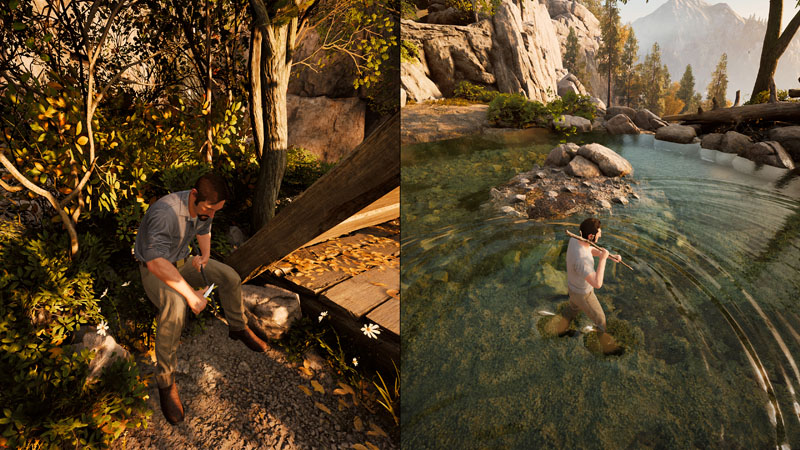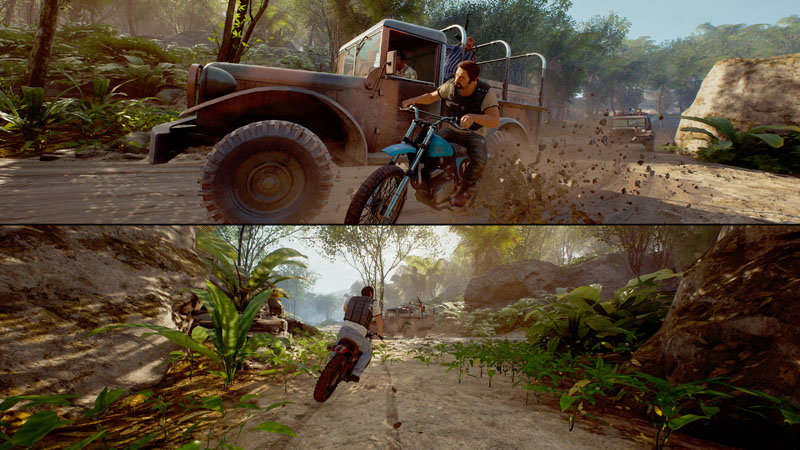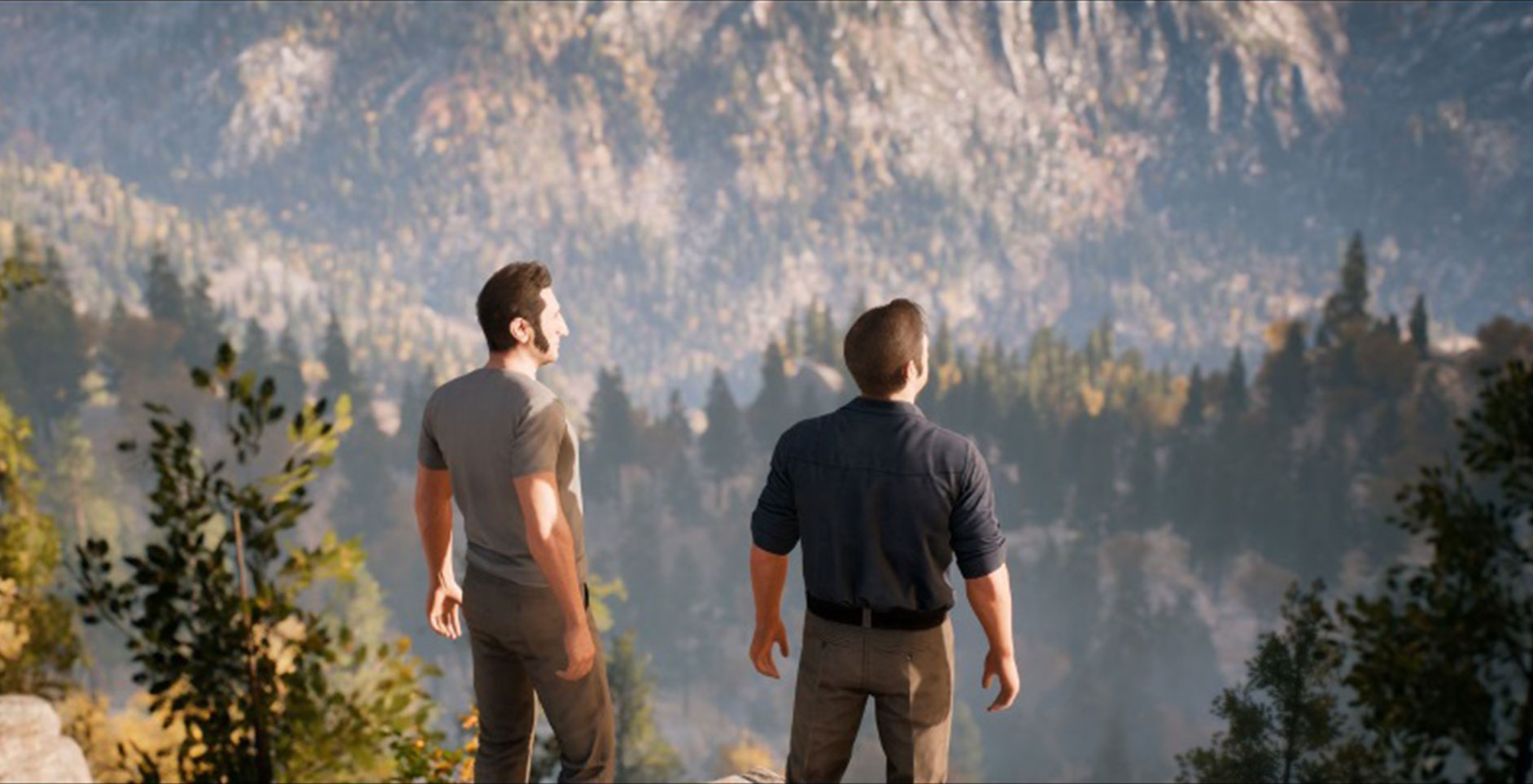Without venturing far from the concept of his previous directorial effort, Brothers: A Tale of Two Sons, the filmmaking adept Josef Fares leans heavily on his strengths by crafting A Way Out, his sophomore release, which is a wonderfully cinematic tale of revenge. Though A Tale of Two Sons shattered expectations by having us control both brothers simultaneously, A Way Out is a more traditional co-op experience and it’s only playable online or in couch co-op.
Let’s start by commending Fares on his steadfast determination to design A Way Out as a shared experience. Though you’re able to elegantly share a copy with your friend, removing the need for two purchases, it’s still a bold decision and a high-risk one at that. I often give a broad swerve to co-op modes in games because they don’t often do anything differently, A Way Out makes use of and gives purpose to both players in equal measure.

A Way Out follows the stories of two prison inmates who plot to break out of prison to exact vengeance on someone who wronged them both, separately, in their pasts. When we’re introduced to the pair, Leo is six months into his eight-year sentence while Vincent is fresh meat. For clarity sake, I played the game as Leo. I was fascinated to discover that, as the credits rolled, my co-op partner felt Vincent was the game’s hero, whereas I felt the opposite. That, to me, is a mark of fine writing from Fares, as he managed to pen two relatable, grounded characters with, after all the revelations, had believable and, for the most part, sympathetic motivations. The game’s first act — the prison break itself — was a bit of a slow burn as far as storytelling goes. That said, it was early on when a large chunk of the more intricate team bonding happened and the relationship between Vincent and Leo was truly forged.
Once out of the joint, A Way Out transforms into a more high-octane action-adventure game that peppers in the odd breather to break up the chaos that meets these fugitives around every corner. But even within this much-needed downtime, you’ll find countless tasks to test the friendship with a bit of friendly competition. We played baseball, darts, played hoops and even had a battle of balance in a pair of wheelchairs. It’s astounding just how much is bundled into this game, considering the size of Hazelight Studios. You very rarely retread the same ground, you slew through dense Mexican jungle on dirtbikes and the game’s final act is just a masterwork of defying expectation as the stakes explode through the ceiling in a climactic closing scene. If someone were to tell me that A Way Out began its life as an Uncharted sequel before mutating into an indie darling about two jailbirds, I’d believe it. Fares’ direction and writing nous — even if A Way Out strays into cliche at pivotal plot points — has helped create an incredibly immersive blockbuster on what I’d have to imagine is a shoestring budget compared to the big franchises.

A Way Out’s first couple of hours are a methodical dismantling of the prison system that, at first, left my partner and I unconvinced. It was slow and our characters were behaving in ways that, until you reach the credits, didn’t really make a whole lot of sense. We feared the worst. It’s not until I look at it retrospectively that I appreciate the first act for what it is. Trust and understanding are earned during the escape, which lays a great foundation for the trials that come later.
A Way Out’s puzzles play out in a fairly formulaic manner. In fact, they often make for better set pieces than they do puzzles so if you’re here for a co-op head-scratcher, you’re in the wrong place. You’ll often have one player distracting while the other sleuths on by to retrieve a key item or reach an area further ahead to advance the other’s progress. It’s enjoyable for the most part and no story-advancing exercise is really like any before it, so A Way Out remains fresh and interesting throughout its six-hour runtime.
Traversing the world at large can be a tad more rudimental as the game leans on its handful of set co-op tricks to press on the escape route. You’ll see more than a fair share of boosts and slow-motion last second catches before the credits begin to scroll. There is a heap of non-playable characters to chat to throughout the game, though a majority of them are within the prison’s walls. For the most part, they were inconsequential, pointless and existed solely to pad out a chapter’s length should a player make the grave error of talking to them. On the other hand, A Way Out does excellently place in a bunch of branching paths where both players must decide whose plan to see through. Often times, Vincent’s is a pacifist route whereas Leo’s is more wild and volatile, which is an apt reflection of their character as defined by Fares.

For a game that banks so much on being online-only for a majority of players, my partner and I didn’t really happen across any huge connectivity issues. There was one disconnect we had, though I believe it was my network rather than the game’s servers. Aside from a few instances of heavy stuttering, the game gets a big tick for its silky performance.
Not only are Vincent and Leo superbly realised characters with all of their flaws and misplaced machismo, the game’s world plays as big a role as our heroes. Though it is never determined where the prison is, the outside world is a mountainous and rural playspace. The amount of love that has been poured into the game’s scenery constantly floored me as its lush forestation was a low-key star of the show. A Way Out’s subtle visuals do wonders in painting the almost untold pictures of the contrast between Leo and Vincent. The former’s family, as we see, is bound to a trailer park whereas Vincent’s alienated wife lives in affluence. It’s a rare instance where a thoughtful game is held higher again by its thoughtful imagery and Hazelight has kicked a lot of goals here.



